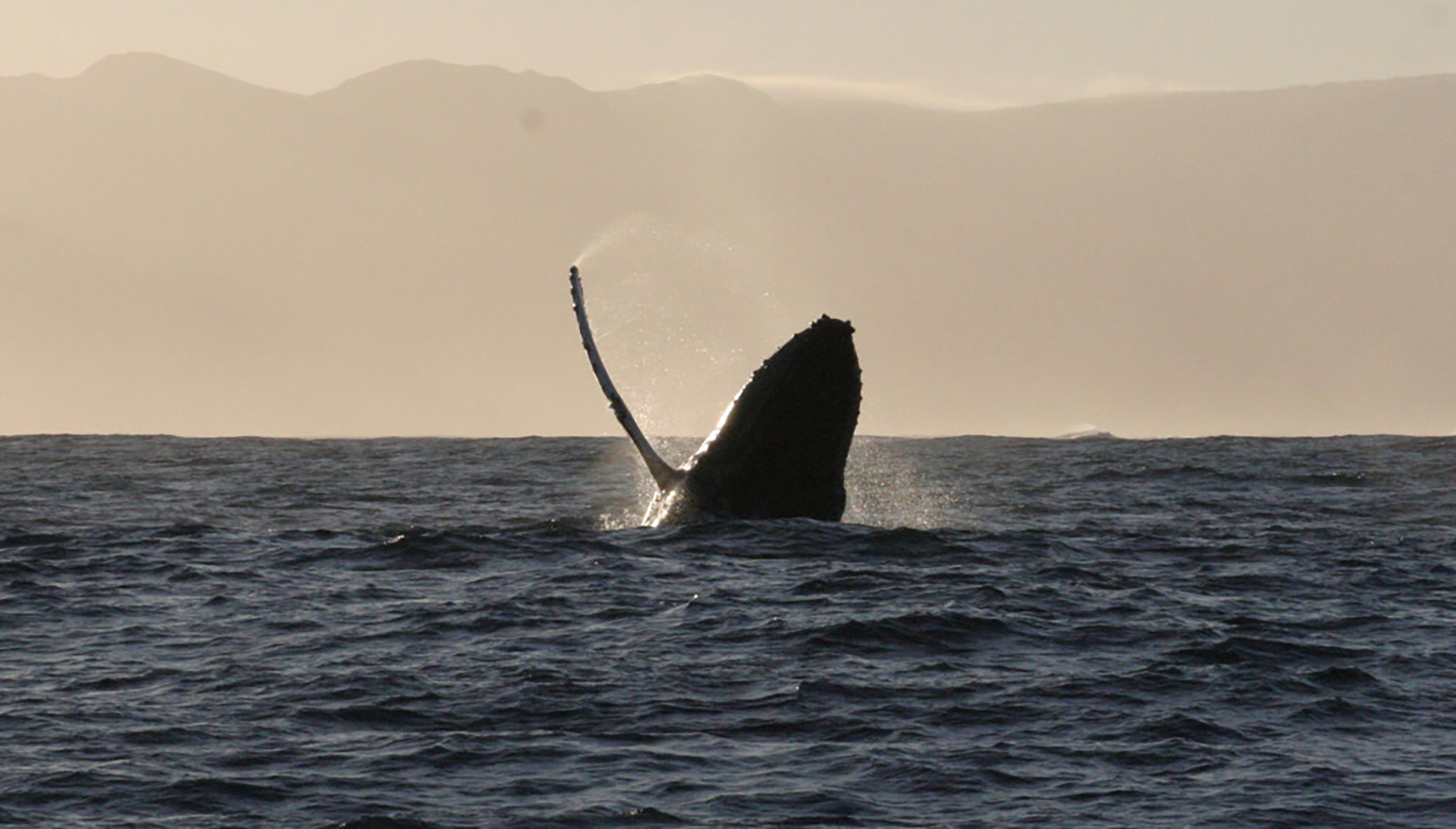Whales may well be safe from commercial whaling in most countries, but that doesn’t mean they are out of the woods.
Dr Gwenith Penry, a marine mammal biologist and research associate at the Institute for Coastal and Marine Research at Nelson Mandela University, told Daily Maverick that “species have recovered pretty well, like humpback whales, and others haven’t, like blue whales”, explaining that the humpback whale population has increased since commercial whaling ended in South Africa.
“It depends very much on the species. It’s like calling a lion and a leopard a cat – they have very different biologies and behaviours.”
South Africa supports the International Whaling Commission’s moratorium on commercial whaling that was introduced in 1986, but according to the Department of International Relations and Cooperation it has been a non-whaling nation since 1975.
“The population is increasing, which is why those groups are becoming more obvious and more apparent,” said Penry in reference to the “supergroup” whale pods seen along the West Coast recently.
And, like humpback whales, the population of the southern right whale, a migratory species also found along South Africa’s coastline, has been rising – by about 7% a year.
“A couple of decades ago, southern right whales were in a worse state than they are now, and the same with our humpback whales. So their conservation statuses have improved,” said Penry.
“But we’re seeing more drastic fluctuations in the numbers that come to our coastline, and current thinking is that this is related to reduced prey availability in their Southern Ocean feeding grounds.”
While humpback whales and southern rights aren’t classified as vulnerable, unlike the resident Bryde’s whale that Penry specialises in, she said they are still of conservation concern because of a growing number of threats in our oceans.
“There are also massive ecosystem changes that are more noticeable on the West Coast, and that’s probably related to climate change and anthropogenic activities, which affect factors like current strength productivity, which is typically what is keeping those supergroups around.”
The World Wildlife Fund (WWF) has reported that six out of the 13 great whale species are classified as endangered or vulnerable.
While commercial whaling – which used to be a major threat to whale populations – has been banned in many countries (barring Japan, Iceland and Norway), whales still face many threats which are more complicated and intertwined.
“Commercial whaling was devastating and some populations may never fully recover. Lengthy scientific and political processes were required before the moratorium was affected, but as a whole it was a single industry that could be identified and addressed,” explained Penry.
“Modern threats to whales are often more cryptic and intertwined, and addressing them requires complex socioecological, political and economic cooperation to address them.”
Penry said the conservation concerns around our whales follow a global trend, with “increasing coastal development, increased shipping disturbance, more people living here, discarded fishing gear, plastic ingestion, pollutants, pollutant runoff from [agriculture]”.
“I dissected a killer whale six years ago here that just had a stomach full of plastic. So, it’s our horrible lifestyles that are affecting them.”
Penry said that globally entanglement and ship strikes are the biggest threat to large whales, having population-level impacts. (Watch a whale disentanglement here)
There is increased disturbance from shipping, both from noise and ship strikes.
“So those ‘supergroups’ on the West Coast, they’re at a huge risk from ship strikes because they’re so close to shore feeding, and they are big, dense groups.”
Penry said entanglement is probably the biggest threat to whales currently, and has increased over the past few years.
“It’s increased, one because fishing efforts have increased – more global demand – [and] there’s more discarded or lost gear just floating around, because that happens sometimes – guys lose their gear or something’s broken.”
And second, “some populations are recovering, so the chances of an animal encountering it are higher”.
Mike Meyer, operations manager at the South African Whale Disentanglement Network, said there was a huge increase in whale entanglements from 2016 to 2020. In 2020 there were 38 reported entanglements, the most they’ve had.
Meyer said “superpods” of whales (that can consist of 300 to 400 animals) have faced more entanglement in recent years due to changes in wind which affects nutrient upwelling.
“We’ve had an increase in the southeasterly wind, carrying on right up to February, sometimes March, so what we get is this upwelling and nutrients coming to the surface,” he said, explaining that this coincides with periods of increased commercial fishing, which contributes to increased entanglement.
Penry said entanglement is more intense in certain areas around the world, but it’s killing some species at a rate that’s not replenishable, causing the populations to decline.
“Fishery gear, both lost and that which is set, is just increasing and becoming more of a hazard.
However, “there’s a lot of work going on to improve gear, some fisheries are on the whole quite open to changing gear or trying different gear types and mechanisms to reduce the amount of rope in the water column which is an entanglement hazard”.
The Whale Disentanglement Network has made strides in this area, significantly reducing entanglements in shark nets and octopus lines by changing mechanisms and gear.
Efforts like these, said Penry, are a national imperative as these teams need to be trained all along the coastline since entanglements are increasing.
In October 2021, Penry joined a Whale Disentanglement Network operation to disentangle a two-year-old humpback whale in Plettenberg Bay. It was wound so tightly around its tail that it took three hours to free the animal. It was like a noose and trailed about 15m behind it.
“If it had picked it up in Mozambique, it would probably have been on it for three, four weeks.”
Global warming
Meyer said they have seen an increase in entanglement (that wasn’t just reflective of population increases) since 2016, but the more important threat is global warming since it influences food availability and movement.
“What has happened is that the animals are disappearing, they’re moving somewhere else, probably because there’s food somewhere else, and they’re not getting the food. And as you know, the plankton in the Antarctic breeds mostly under the ice, and the ice is reducing. So things are changing, currents are changing, temperatures are changing, and food distribution is changing.”
Penry explained that changing temperatures and wind strength have changed the current systems, reducing nutrient upwelling in the Southern Ocean.
“Whales migrate to Antarctica to feed. As Antarctica is feeling the effects of climate change more heavily, it’s having an effect on nutrient upwelling and thus the whole food chain. So, if that doesn’t happen, because of weakening currents, or temperatures are too high, the plankton blooms don’t happen... then your whole food chain is affected.”
According to the WWF: “Warming oceans and loss of sea ice in the Arctic and Antarctic can affect the habitats and food of whales. Large patches of tiny plants and animals that they feed on will likely move or change in abundance as climate change alters sea water temperature, winds and ocean currents.”
Penry added: “It’s a much more cryptic threat – to the ecosystem rather than to the individual whale. So the environment is under attack by noise and pollution and rubbish, which then affects the health of the habitat that the whales rely on; their prey, their calving and resting areas, and their migration corridors.”
As the WWF has reported, “whales are at the top of the food chain and have an important role in the overall health of the marine environment”.
“Whales play a significant role in capturing carbon from the atmosphere; each great whale sequesters an estimated 33 tons of CO2 on average, thus playing their part in the fight against climate change.”
Penry agreed: “Whales play an important role in helping us to fight the climate crisis, as carbon sinks – when a whale dies, it sinks to the bottom of the ocean, taking a lot of the carbon with it – but it also creates a really valuable nutrient source for organisms that don’t easily find food.”
They have value to humans and the fight against the climate crisis because they are indicator species, she continued.
“They’re visible, they’re charismatic – people are watching them, studying them, they’re more accessible than some of the smaller, more cryptic species. So, changes in whale distribution, their behaviours, their feeding strategies are visible to us… they indicate changes in the environment to humans, which are then indicative of what’s happening in the ecosystem.”
In terms of their value to the ecosystem, they are vital in keeping the natural ecological balance of the food chain and help with nutrient upcycling.
“There’s a recent study which recalculated the amount of prey that whales consume, and consumption was found to be three times higher than we originally estimated. Which is just showing that because there are fewer whales now there’s less nutrient cycling,” said Penry.
“So it’s really important to ensure that numbers increase so that they eat more and then they defecate out more nutrients into the system.” DM168
This story was first published by DM168 newspaper.

This article is more than 3 years old
South Africa
The harpoons are gone, but whales face more complex modern threats
Commercial whaling may have been banned in many countries, but a host of cryptic and intertwined dangers is putting these marine mammals at huge risk again.





